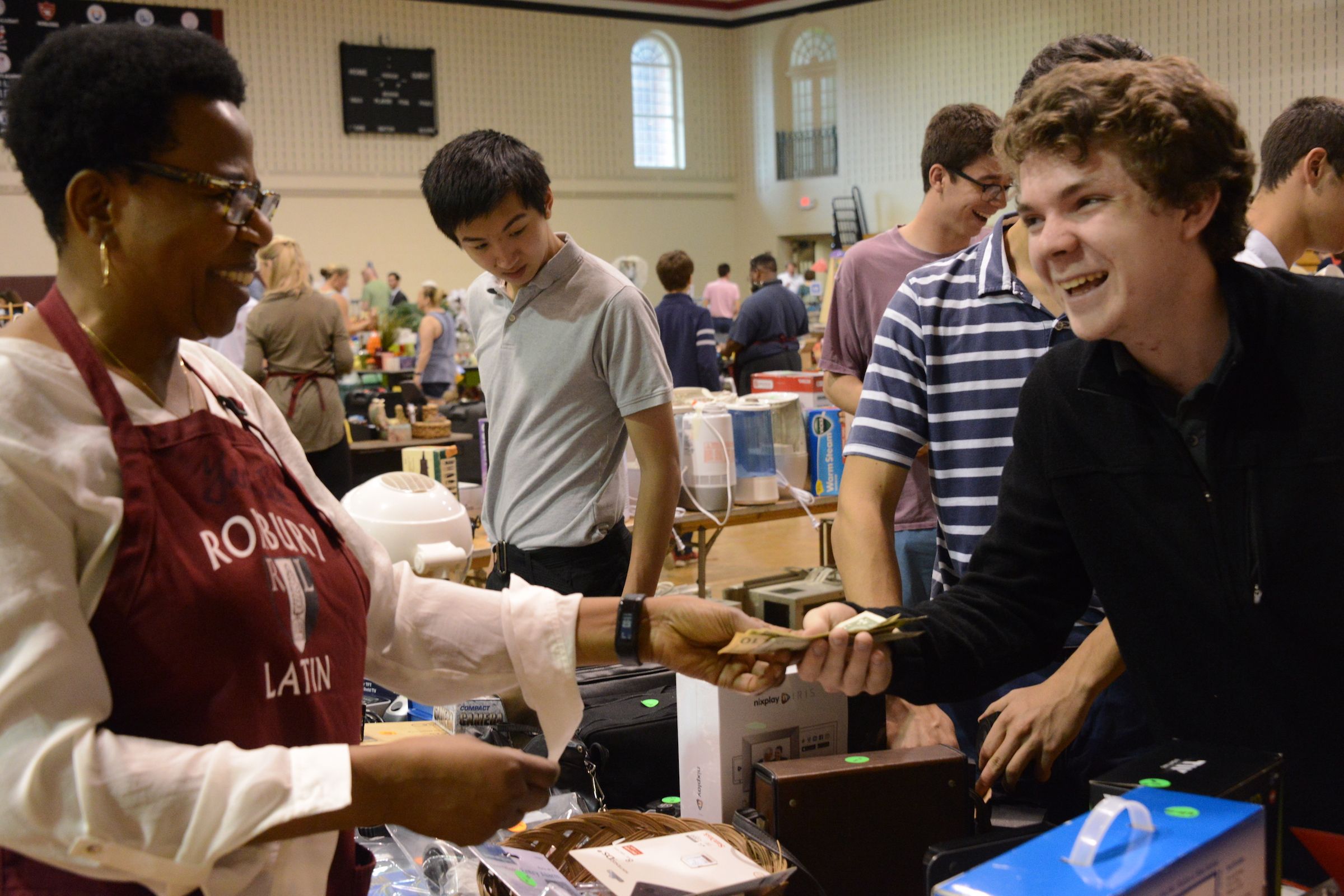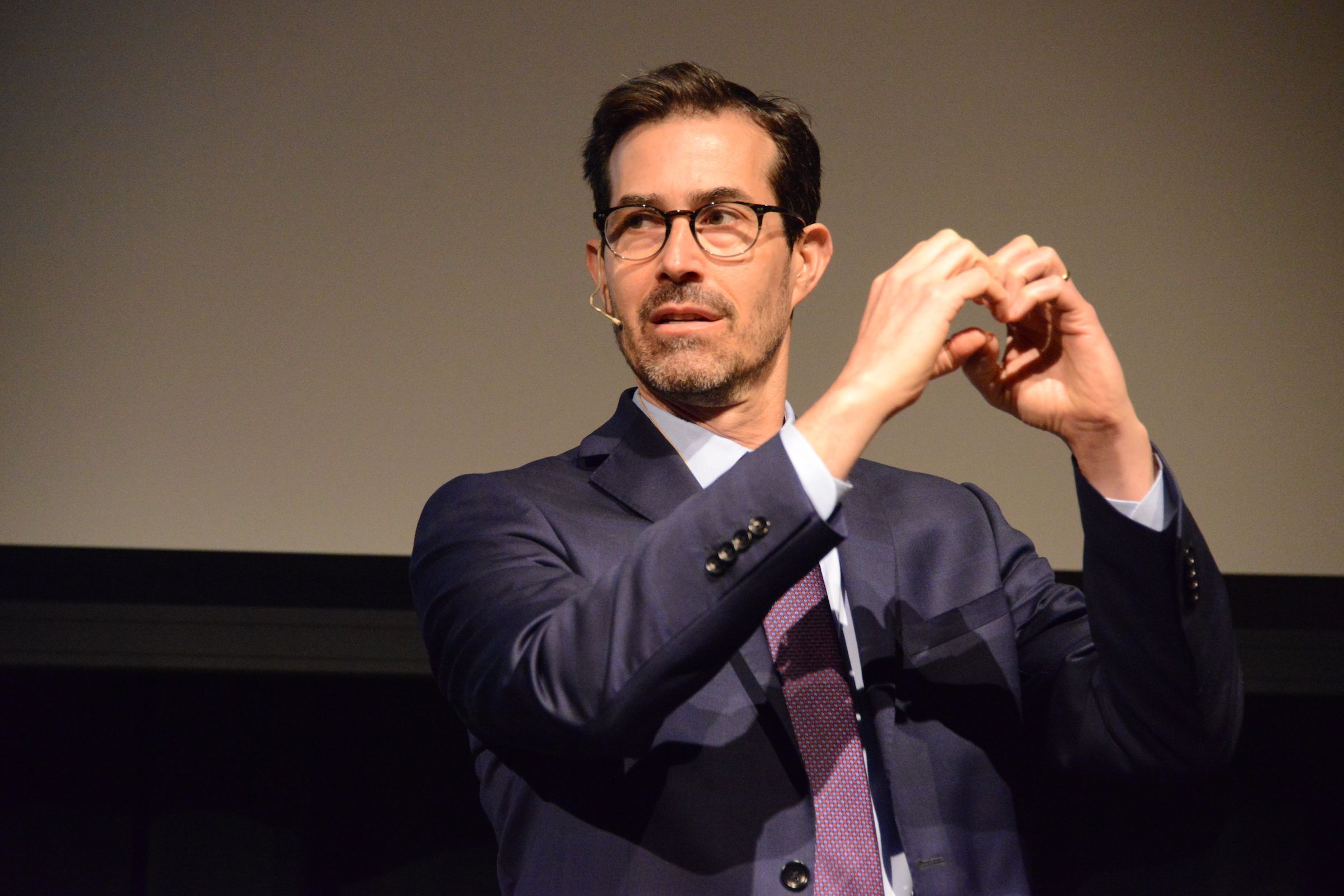On April 1, Headmaster Kerry Brennan welcomed students and faculty back from March break, thus launching the 2019 spring term—and pulling a great April Fools Day prank, jokingly reporting that the school would be going co-ed. Once the gasps, cheers, and laughter died down, Headmaster Brennan got to the heart of the morning’s theme: practice, and the critical role it plays in self-improvement.
He began by sharing the deep concern he felt as a young boy, when his mother insisted on bringing him to a pediatrician who “practiced medicine.” (He thought it much more sound parenting to bring your nine-year-old child to a doctor who was already expert at medicine.) Then—as is a reliable start at a Latin school—Mr. Brennan reminded students and faculty of the origin of the word practice: “There are a few ways to interpret the term ‘practice,’ taken—as most words we know are—from the Latin practicus related to ‘practical’ and the Greek praktikos meaning to pass through or over, to experience, transact, negotiate… For doctors, lawyers, and teachers, the ‘practicing’ they do has to do with the actual application of knowledge as opposed to the mere possession of knowledge.”
Mr. Brennan then asked students and faculty to ponder the ubiquitous phrase, Practice makes perfect. “What one learns from the act of practicing is that to get good at anything requires plenty of work. This work is often airless, punishing work. It’s repetitive. And dull. But if done right, the ‘work’ of practicing becomes less arduous because we get better at it. We get more fluid and physically coordinated… It takes a leap of faith to imagine that it will lead to something wonderful someday—that the hard work will pay off.” Mr. Brennan pointed to the research of Malcolm Gladwell, who arrived at the premise, in his book Outliers, that a certain level of elite performance was realized once an individual had committed 10,000 hours of practice to his or her particular passion.
Thirteen members of the RL community—faculty and students—took turns at the microphone then, reflecting on their own passions and on what the phrase “Practice makes perfect” means to them. Mr. Brennan prompted them to consider the following: What are your rituals? How do you get psyched to put in the time? Where does the discipline come from? How can one endure the deferred gratification that is implicit in all this? Where does criticism come from—internal or from revered mentors or various audiences? How can one measure success? Three excerpts of those remarks are included below. You can view the entirety of the Hall presentation here.
“Each of us is capable of great things,” Mr. Brennan concluded. “We may not always concede that that is true. We have bad days. We have unproductive stretches. We have failed attempts. We become discouraged. We wonder if all the work is worth it. When we have these doubts, when we feel like throwing in the towel and receding into easy mediocrity, I want you to access a deep wellspring of support that is within you… Don’t let the perfect be the enemy of the good. Too often we shy away from challenges and even potentially great joys because we are convinced we won’t be excellent or certainly not the best… Be wary of many external markers of your worth… Be your own best critic. Measure yourself by your own developed standards and appropriate, but achievable, goals. And go for it. Each of us stands ready for you to be the best you can be, to pursue your passion, to know the satisfaction of getting really good at one thing even as you are already quite good at many. And always remember, regardless of some admirable standard, that whatever you do is plenty good enough.”
Deane Dean of Faculty, Dr. Phil Kokotailo, on fly fishing:
“Many times, while fly fishing, I know that I have made a perfect cast, but no trout has risen to the fly. ‘How can that be?’ I’ve said in frustration. ‘That cast was perfect! It deserves a trout!’ But the trout, unlike the cast, is out of my control. Perhaps it wasn’t hungry; perhaps it wasn’t there. Either way, the magical moment didn’t happen, when a camouflaged trout rises unseen until the last second and breaks the surface of the water, occasionally propelled by its strike into the air above, its colors reflected in the light for just an instant. There’s a difference, then, between perfection and success. Perfection depends on you and your willingness to practice. Success depends on something else and its own needs and desires. Perfection is an accomplishment, but success is magical.”
Eric Zaks, Class I, on playing the cello:
“Repetition is an unavoidable aspect of improving at any task and takes a lot of time. But repetition means nothing if you cannot tell what you are doing wrong. What distinguishes great musicians from ordinary ones is their ability to observe their own playing and understand what they can do better. For me, this is the most difficult challenge. Simply playing something over and over again will never lead to a flawless performance. Being able to listen closely and implement changes quickly is crucial. Every musician strives for perfection, but this goal is impossible to achieve. You could play every note exactly in tune but feel unsatisfied with a performance. A musician plays a piece the way he or she wants it to sound, and there is always something that can be changed.”
Erin Dromgoole, History Faculty and Track and Field Coach, on running:
“Appreciate others. Value the people who contribute to your success: the parents who drive you to practice (and nag you about your eating habits and your bedtime); the coaches and leaders who spend hours building a training program for you; the Refectory workers who relieve you of the need to cook and clean up after your meals; the trainers who tape you up; the Buildings & Grounds crew who prepare your playing surface; and especially the opponents who drive you to succeed. Appreciating the work that others do to help you gives you ‘teammates’ in your pursuit of excellence… As for appreciating your opponents: When I lie in bed at night in the months leading up to a big race, I ask myself: ‘What did my rival do to get better today? Did I do my best to match that effort?’ Appreciating my rivals’ hard work is one way that I motivate myself… And if you don’t respect your opponents, can you even respect your own victory after the fact?”










